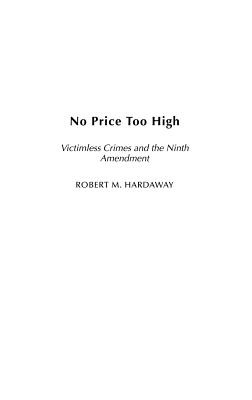
- We will send in 10–14 business days.
- Author: Robert M Hardaway
- Publisher: Praeger
- ISBN-10: 0275950565
- ISBN-13: 9780275950569
- Format: 15.7 x 24.1 x 2.3 cm, kieti viršeliai
- Language: English
- SAVE -10% with code: EXTRA
Reviews
Description
Hardaway argues the criminalization of victimless crimes violates the Ninth Amendment to the U.S. Constitution and creates enormous public policy problems in the society. He contends that the Ninth Amendment adjudication model and the concepts of self-determination and the harm principle are the standards to which privacy issues should be litigated.
Hardaway contends that privacy issues should be litigated under the standards of the Ninth Amendment to the U.S. Constitution adjudication model, concepts of self-determination, and the harm principle. The Ninth Amendment follows the true beliefs of the founding fathers and their adherence to Natural Law, autonomy, liberty, and the right to privacy. This model needs to replace the substantive due process analysis in the realm of personal autonomy issues used by the courts.
The recognition of self-determination and the harm principle will provide individuals with the constitutional protection of rights the founding fathers thought to be imperative to an ordered liberty. By seeking to explain American policy on victimless crimes of which drug use is one, Hardaway seeks to stir a vigorous constitutional debate. As he shows, prostitution and gambling raise similar issues, and he questions whether criminalization serves the interests of society. In examining drug use, prostitution, and gambling, Hardaway compares the policy rationales for each of these societal problems with a view towards creating a general theory of decriminalization. An important analysis for scholars, students, researchers, and public policy makers involved with constitutional law and contemporary criminal law concerns.
EXTRA 10 % discount with code: EXTRA
The promotion ends in 21d.23:23:57
The discount code is valid when purchasing from 10 €. Discounts do not stack.
- Author: Robert M Hardaway
- Publisher: Praeger
- ISBN-10: 0275950565
- ISBN-13: 9780275950569
- Format: 15.7 x 24.1 x 2.3 cm, kieti viršeliai
- Language: English English
Hardaway argues the criminalization of victimless crimes violates the Ninth Amendment to the U.S. Constitution and creates enormous public policy problems in the society. He contends that the Ninth Amendment adjudication model and the concepts of self-determination and the harm principle are the standards to which privacy issues should be litigated.
Hardaway contends that privacy issues should be litigated under the standards of the Ninth Amendment to the U.S. Constitution adjudication model, concepts of self-determination, and the harm principle. The Ninth Amendment follows the true beliefs of the founding fathers and their adherence to Natural Law, autonomy, liberty, and the right to privacy. This model needs to replace the substantive due process analysis in the realm of personal autonomy issues used by the courts.
The recognition of self-determination and the harm principle will provide individuals with the constitutional protection of rights the founding fathers thought to be imperative to an ordered liberty. By seeking to explain American policy on victimless crimes of which drug use is one, Hardaway seeks to stir a vigorous constitutional debate. As he shows, prostitution and gambling raise similar issues, and he questions whether criminalization serves the interests of society. In examining drug use, prostitution, and gambling, Hardaway compares the policy rationales for each of these societal problems with a view towards creating a general theory of decriminalization. An important analysis for scholars, students, researchers, and public policy makers involved with constitutional law and contemporary criminal law concerns.


Reviews